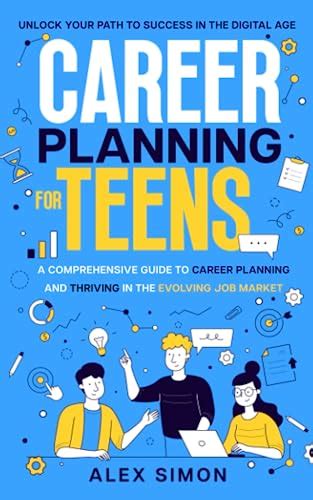In the rapidly evolving contemporary job market, it is crucial for individuals to cultivate a forward-leaning mindset and embrace a proactive approach towards career planning. By equipping oneself with the necessary skills, knowledge, and adaptability, you can position yourself for success in the years to come.

1. Identify Your Interests and Passions
The foundation of a fulfilling career lies in pursuing something that aligns with your values, interests, and aspirations. Explore a wide range of occupations, industries, and educational pathways to discover what truly resonates with you. Consider your hobbies, extracurricular activities, and volunteer experiences to gain insights into your passions.
2. Acquire In-Demand Skills
The job market is constantly evolving, with new technologies and skills emerging regularly. To remain competitive, it is essential to acquire in-demand skills that meet the needs of modern businesses. This may involve pursuing higher education, certifications, or online courses. According to the World Economic Forum, the top skills for 2025 include:
| Skill | Estimated Demand Growth (%) |
|---|---|
| Analytical thinking and problem-solving | 39 |
| Active learning and learning strategies | 37 |
| Creativity, originality, and initiative | 33 |
| Technology design and programming | 32 |
| Critical thinking and analysis | 30 |
3. Build Your Professional Network
Networking is an invaluable tool for career advancement. Attend industry events, connect with professionals on LinkedIn, and engage in online communities related to your field. The more people you know, the more opportunities you will have to learn about job openings, gain mentorship, and advance your career goals.
4. Gain Practical Experience
Hands-on experience is highly valued by employers. Seek out internships, volunteer opportunities, or part-time jobs to develop your skills and gain real-world experience. This not only enhances your knowledge but also allows you to build your resume and make valuable connections.
5. Develop a Career Plan
A well-defined career plan provides direction and focus for your professional journey. Outline your short-term and long-term goals, identify the skills and qualifications you need to acquire, and create a timeline for your career progression. Regularly review and update your plan to ensure it remains aligned with your changing needs and aspirations.
Common Mistakes to Avoid
- Ignoring the Importance of Soft Skills: While technical skills are essential, soft skills such as communication, teamwork, and problem-solving are equally crucial for success in any profession.
- Underestimating the Value of Education: Higher education or specialized certifications can significantly boost your career prospects and provide you with a competitive edge in the job market.
- Lack of Networking: Networking is vital for career advancement. Make an effort to build relationships with professionals in your field and explore opportunities for collaboration.
- Relying Solely on Job Boards: While job boards can be useful, they represent only a fraction of available job openings. Explore other channels such as LinkedIn, company websites, and networking events for a more comprehensive job search.
- Not Adapting to Change: The job market is constantly evolving. Embrace a lifelong learning mindset and stay up-to-date with industry trends and advancements.
FAQs
1. What are the most in-demand jobs for the future?
According to the Bureau of Labor Statistics, the following occupations are projected to experience significant growth over the next decade:
| Occupation | Projected Growth (2021-2031) |
|---|---|
| Software Developers | 22% |
| Healthcare Practitioners | 15% |
| Operations Research Analysts | 25% |
| Statisticians | 33% |
| Market Research Analysts | 19% |
2. How can I make my resume stand out?
- Quantify your accomplishments: Use specific numbers and metrics to demonstrate your contributions and results.
- Highlight your skills and experience: Clearly identify the skills and expertise that are relevant to the job you are seeking.
- Use keywords: Research the job description and include relevant keywords that hiring managers will be looking for.
- Tailor your resume to each job: Customize your resume to highlight the skills and qualifications that are most relevant to each specific job application.
3. What should I do if I am not sure about my career path?
Explore different fields and industries through informational interviews, internships, and volunteer experiences. Attend career counseling sessions to gain insights into your strengths, interests, and potential career options.
4. How can I stay ahead of the competition in the job market?
- Continuously develop your skills: Pursue professional development opportunities and acquire new skills to enhance your marketability.
- Network and build relationships: Attend industry events and connect with professionals in your field to stay informed about job openings and career trends.
- Build a strong personal brand: Establish a professional presence on LinkedIn and other social media platforms to showcase your skills and expertise.
- Embrace technology: Utilize job search tools, applicant tracking systems, and other technology to streamline your job search and increase your chances of success.
